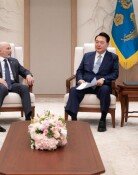Korea must brace for shifting foreign policy amid Trump presidency
Korea must brace for shifting foreign policy amid Trump presidency
Posted November. 10, 2016 07:06,
Updated November. 10, 2016 07:17
Republican candidate Donald Trump has been elected the next president of the United States, with backing of American citizens who are disgruntled about falling income and a jobs crisis. Trump became the standard-bearer of the Republican Party with 160-year history 11 months after declaring his candidacy, and has been elected the president at last, a situation that is extraordinary. The GOP also had a landslide win in the elections for the House and Senate.
Up to 90 percent of U.S. opinion polls and pollsters predicted that Hillary Clinton would win the election, but they have become speechless to witness the situation wherein a political outsider without any experience as civil servant become the White House’s next host. From the very beginning, the latest election was a duel between the established political force that is represented by Hillary and non-institutional outsiders who are represented by Trump and Bernie Sanders (Democrat), rather than a showdown between the rival parties of Democrats and Republicans. The fact that the conventional political circle and mainstream media fail to read changes in public sentiment, and that the outcome was totally unexpected has many implications for Korea as well.
If the slogan President Barack Obama used for his campaign eight years ago was "change," the keyword of the latest election was "anger." The American dream that "a hardworking person can succeed" has broken, and the middle class has collapsed. The belief that neoliberalist policy that continued for decades has become policy of freedom only for those who turn a blind eye to Wall Street greed and for the rich is widely prevailing among the American middle class. Trump, who used in his campaign extreme hatred of foreigners and immigrants, including his election pledge to construct wall along the Mexican border, was able to win the election because he effectively appealed to the emotion of low-income working-class Whites who have seen their dreams for the middle class go up in smoke.
Trump put forward as his key foreign policy agenda "America First" that is armed with protectionist trade policy and new isolationism. Simply put, Trump’s foreign policy is "pay us." He warned that if Saudi Aribia does not send ground troops or pay money, he will block the U.S. from importing crude oil from the Middle East country. He called China "rapist country" that robs the U.S. of knowledge and jobs, and portrayed it as "adversary." There is a strong chance that with tension between the U.S. and China mounting and Northeast Asia falling into turmoil, the Korean Peninsula will turn into the main battleground. With state administration paralyzed as the entire country is reeling from the Choi Soon-sil scandal, Korea is also facing a massive hurricane originating from the U.S., which sends the situation from bad to worse.
Trump has been even trumpeting a hike in South Korea’s share of the expenses for stationing the U.S. troops in South Korea and the South’s possible nuclear armament by blasting this country a "free riding nation" that has achieved economic development while enjoying security provided by the U.S. Before anything, there is a higher chance that South Korea will have to pay an extra 900 billion won to 1 trillion won in contributions for the U.S. forces Korea’s expenses yearly from the current level. Trump called North Korean leader Kim Jong Un "maniac," but left open the possibility for direct dialogue with Pyongyang, saying, “We can talk.” Kim Jong Un could also try to create an environment for dialogue in its favor, including Washington’s implicit acceptance of Pyongyang’s nuclear weapons, easing of sanctions against the Stalinist country by collateralizing its future nuclear weapons while holding dialogue with Washington, and compensation in the form of salami slices. The world is paying keen attention to whether Trump’s blunt rhetoric that his administration will not block South Korea and Japan from pursuing nuclear armament will turn into practical policy or not.
With uncertainties in international trade, immigration, foreign policy and national security escalating, the Korean market immediately saw the benchmark KOSPI index fall below the 2,000 mark, while Asian stocks including Japan, China, and Australia also plunged. There are also mounting worries that the New York stock market, which reopens after the Election Day, will embrace "Black Wednesday." Mexico, which Trump constantly attacked during the campaign, saw the peso plummet, and funds in the global market are scrambling to go after the safe assets of gold and the Japanese yen.
If protectionist trade policy that Trump has advocated strengthens and thus countries come to strive for their own individual survival, the entire world could go into foreign exchange war and trade war. Trump already demanded renegotiation of the Korea-U.S. free trade agreement by calling it a representative case of "broken promise." The Korea Economic Research Institute estimated that if U.S. concession of tariffs is suspended due to renegotiation over the KORUS FTA, Korea would see its export decline by 26.9 billion dollars and 240,000 jobs disappear over a five-year period after 2017.
However, Korea does not need to be too pessimistic. Trump’s remarks are more likely to be political rhetoric aimed at reaching out to his internal supporters during his campaign. Considering the pattern of a new U.S. administration that tends to spend a considerable period of time in reviewing policies, most experts say that specific policies will only start to emerge from around the summer in 2017.
Korea also has lessons to learn from the Trump presidency. It is the common sense that a country should protect its own national security by itself. Whether Korea will turn the Trump presidency into a disaster or an opportunity depends on how well Korea prepares for it.
허문명논설위원 angelhuh@donga.com







